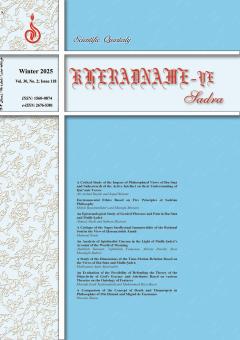An Analysis of Spiritualist Cinema in the Light of Mullā Ṣadrā’s Account of the World of Meaning
Subject Areas : مطالعات حوزه فلسفه و حکمت اسلامیReza Mesdaghi Bahari 1 , Abdollah Salavati 2 , Tajbakhsh Fanaeian 3 , Alireza Darabi 4
1 - PhD candidate of Islamic Philosophy and Kalam, Faculty of Law, Theology, and Political Science, Islamic Azad University, Science and Research Branch, Tehran, Iran
2 - Associate Professor, Department of Theology and Islamic Teachings, Shahid Rajaee Teacher Training University, Tehran, Iran
3 - Associate Professor, Department of Performing Arts, University of Tehran, Tehran, Iran
4 - Assistant professor, Philosophy Department, Faculty of Law, Theology, and Political Science, Islamic Azad University, Science and Research Branch, Tehran, Iran
Keywords: world of meaning, cinema, spiritualist, Transcendent Philosophy, Mullā Ṣadrā,
Abstract :
In the course of history, art has always functioned as a tool for presenting human questions and a scene for posing philosophical discussions. Therefore, various schools have used art as a means of discovering the secrets of being in order to satiate the thirst of man’s knowledge-seeking intellect for the quality of displaying the manifestation of being. However, the art of today, while displaying visual manifestations, allows imagination flow and visualizes metaphysical and other-worldly concepts. The purpose of the present paper is to examine the ways the seventh art approaches immaterial worlds. To accomplish this task, the authors have tried to explore the world of meaning from the viewpoint of the Transcendent Philosophy in order to portray the mind’s processing of the soul’s imaginations based on Mullā Ṣadrā’s view in spiritualist cinema. The motive for this study was rooted in the necessity of presenting a model that could determine the borderline between right and wrong in the world of meaning and suggest a reliable philosophy on the meaning of the world to the addressees. Thus, the main question of this study is which facilities the world of meaning in Mullā Ṣadrā’s philosophy could offer to spiritualist cinema. Accordingly, the Transcendent Philosophy can represent the world of meaning in the light of viewing the perfect man as the source of truth based on a cognitive approach to soulish perceptions of the worlds of matter, Ideas, and intellect. In this way, it would be possible to provide an original image of the duality of meaning and structure on the silver screen through a profound narration of the appearance of phenomena and a dynamic analysis of inner worlds.
